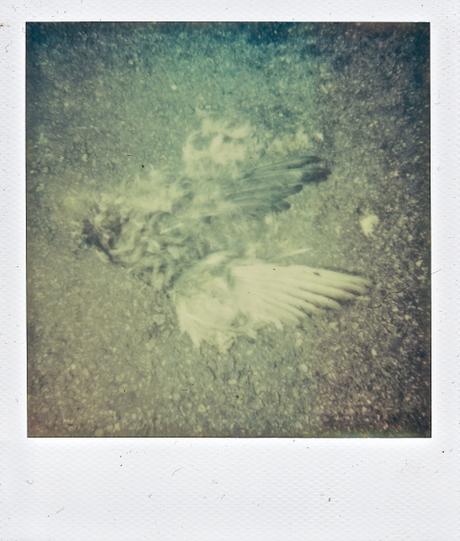 |
| “Former Pigeon,” Christopher Conry |
It was ostentatiously warm in New York last autumn, and it may have been Thanksgiving or, perhaps the day after, when I read in the paper that Brad Creila had died. Brad was an advocate for HIV/AIDS and the founder of HIVster.com; someone I embarrassingly hadn’t thought of in the years since my own diagnosis.
It gives me pause to think about how often we don’t appreciate the people in our lives until they are taken from us, but what a commonly fallible human trait this is.
Brad was one of those people who always seemed to have left the room as I entered it. Like a binary star system, we circled one another on parallel orbits that never quite touched; connected by conversations and associations like some sort of HIV Six Degrees of Kevin Bacon.
I had only met Brad once, before he moved back to Washington State, in a singular night that no one else was privy to. Perhaps the whole thing was a dream or fleeting quantum entanglement. Ultimately it doesn’t matter.
My memories of that night flooded back to me as I read the articles about him and the work he did through his website and his political activism.
It was Thanksgiving, now that I think about it again. I remember the arc of a day of gluttony and mirth slowly winnowing into the still, quiet of a night of sober contemplation; the long dark night of the soul or some other such true cliché. My senses became heightened and the night outside my bedroom window got a little darker as I lay on my bed with my reading lamp on, feeling a little lonelier.
We spent one night alone together and up until now I haven’t spoken of it to anyone. At the time it seemed a perfectly ordinary night, and only on reflection does it bear a significance as an important reminder to me to appreciate being, and where I am, at every moment of my life. For the moments in my life not to be significant to me only looking back on them but to be deeply and fully present.
Brad achieved so much in the short time he was on this Earth. He is an inspiration to achieve greater things with my time, and with more passion.
I thought it would be important to share my memory of our night together, lest it become lost in my mind. To share Brad’s private side in addition to all the important political work he did.
The private side of a public figure.
***
It was 2012, and I was about a year into my own diagnosis.
I had successfully maneuvered my first year of pill schedules; of do I need to tell my parents?; of do I need therapy?; of do I need a support group?; of do I like my doctor?; of being afraid of running into someone in his waiting room; of having to triple check that I took my meds in the morning before leaving the house; of not being able to leave the house; of who among my negative queer friends do I tell? of who among my negative straight friends do I tell? of bitchy queens gossiping about my status; of drag queens making AIDS jokes and feeling rage; of shaking; of screaming; of long silent walks; of seeing my parents for the first time; of taking pills in my childhood bedroom; of seeing the ghost of my youth in the woods behind my parents’ house; of a wall coming down; of feeling like you’re looking at life obliquely through a prism all the time; of lying in the dark under quilts; of the heavy presence of time; of the fear of lost opportunity; of the fear that no one will be able to love me; of a profoundly loud silence; of feeling very keenly the precious sting of existence.
I had just returned home from my first Christmas since seroconverting and I was feeling rather maudlin; returning from Vermont and landing at JFK on a gray, rainy December day. Travel always brings out my melancholia; the sadness of transition and the fleeting ephemerality of the human condition. Sunday, cemeteries and twilight also bring out this particular emotion in me but often to combat this sweet, syrupy sadness I try to remind myself that leaving is also a form of arriving.
I took a cab back to my studio apartment in Brooklyn and stepped into the stillness of an empty house--what did my apartment do while I was away? I wondered. How do our things experience one another outside the mediator of human consciousness? What did my lamp and my refrigerator gossip about while I was gone?
I was far enough along in the process of dealing with my HIV and its attendant changes in my life that it was realistic for me to consider starting to date again. The panic attacks, rage and depression were becoming manageable; I was working from home at the time, which allowed me the flexibility I needed to work out some of these issues; and I was starting to become social again. I had a dating profile on a few sites, and Brad had reached out to me via POZ.com before I left for the holiday and we had plans to connect when I returned from Vermont and we had exchanged emails and phone numbers.
I set my suitcase under my bed and put my clothes away, putting on a movie in the background and reflecting on the holiday with my family; about the meaning of holidays, family, faith and redemption. Reflecting on death, and on nothing and everything as is my cursory habit.
I got a text message from an unknown number.
I inferred from the context of our back-and-forth that it was Brad and we arranged to hang out that night. A cold, wet miserable night of sleeting rain in that empty week in New York between Christmas and New Year’s--how could it go wrong?
We agreed to hang out at his apartment, watch movies and get delivery. I got a car service and made my way from Greenpoint to Bushwick. The black car seemed cocoon-like, being inside the shell of a beetle; the vision outside was obscured by gray skies expelling sheets of lashing sleet as and the effect of the ride was as though going through a wormhole that doubles as a car wash.
He let me in, his sister’s apartment--he was staying with her--and I remember hair falling down over his quiet eyes and a half smile as he pulled the door back. We stood in the darkened living room, ceilings unnaturally high for a New York apartment, surrounded by plants and midcentury furniture with a shock of fluorescence pooling in from the adjacent kitchen sending stripes of shadow over us between the palm fronds.
We stood and talked for a minute through the cursory examination of a first date before going into the kitchen; we shared a joint and put a kettle on to make tea and ordered Indian food, a mutual passion we ferreted out in the tennis match of two people getting to know one another.
Brad told me about growing up outside Seattle, the mercurial weather, the rain and sleet, and the halcyon days of Sub Pop Records; his days on the party scene of indie rock, raves, gay, straight and the myriad Venn Diagram of Pacific Northwest social scenes and the myopia of youth that led to his seroconversion.
He told me about his copraporphyria, about the severe stomach pains that sometimes caused an inability to eat and how this further complicated his HIV medication regimen. About not being able to make over a certain amount of money in order to continue to qualify for disability and for the first time since my own diagnosis the precariousness that the high cost of keeping a roof over your head and medicine in your body enforced on one’s ability to thrive in a capitalist society. The restrictions placed on those trying to enact change on the human condition, placed by those who seek to profit from it.
He told me about HIVster.com and his hopes to partner with other websites, publications and organizations and about his political work.
I saw in him someone like King Midas or the princess in Rumpelstiltskin, who turned weakness into strength. Perhaps the places we see weakness serve to reveal our own biases.
After eating we went into his sister’s room (she was away visiting his grandparents) and jumped up on her bed, one of those big high beds that makes you feel through the looking glass, to watch Clue and Waiting for Guffman still talking about life and making out intermittently, gently as the sleet continued to pelt the window panes.
I woke up first and watched him sleep for awhile, someone too young to be this tired. He woke up and we made coffee and breakfast and made plans to see each other again. We had a fast and deep connection. Ultimately we weren’t able to find time to reconnect; in the maelstrom of New York City and your mid-20s, our ships were fated to pass each other only this one night.
No one else was there, and until now I have told no one of it. But upon learning of Brad’s passing I felt urged to share this singular exchange of intimate humanity, a private portrait of someone so deeply humanistic.
One can’t help but imagine what could have been; but then I suppose that is the nature of living.
Christoph3r C0nry is a multimedia artist and theorist. He received his BFA (cum laude) from Emerson College in visual and media arts. He lives and works in Brooklyn.







Comments
Comments